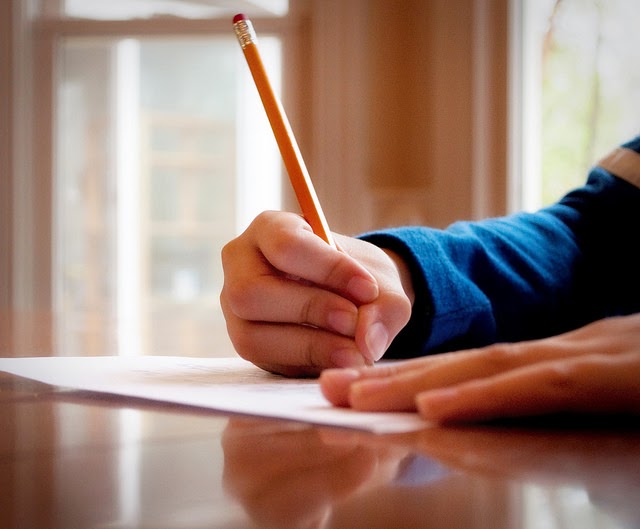This post has been written by Amberlynn Gifford – creator of the ever popular app “SnapType for Occupational Therapy”.
When I created SnapType last year, I knew it would help children struggling with handwriting. However, I could never have imagined the outcry of support I received from therapists and parents. Each week I read several emails from users with stories of how SnapType has changed their lives.
“Thank you for this app! You are a blessing! I can honestly tell you that I have spent many hours crying and hurting inside while watching my son struggle to write pages of sentences and spelling words and other homework assignments. He screams out with frustration. It’s been so bad that I have stopped him and honestly wrote for him, left handed to make it look more like a neater version of his because I could not take it anymore! Now, with SnapType, he completes his worksheets, show off his intelligence and feels more confident than ever. Thank you from the bottom of my heart!”
That was an email I received from a mother who felt like she was losing her son. I tear up while reading emails like this from parents and it brings me so much joy to know that these children are succeeding with the help of SnapType.
I have learned along the way that SnapType helps not only children with dysgraphia but also individuals with several other learning disabilities, low vision, low muscle tone, and Parkinson’s. It is so exciting to learn that a variety of individuals can benefit from SnapType.
When I first had the idea for SnapType, I wanted to test out the idea as quickly and inexpensively as possible. So I paid a developer in India $300 to build the first version of the app. It was so basic, but it was the perfect way to quickly find out if anyone would find value in my idea. With tens of thousands of downloads, and over a hundred emails from users, it was clear that people were finding value in the app.

I wanted to give the users what they were asking for. But being a full time occupational therapy graduate student, I couldn’t afford to pay thousands of dollars to get the app made. I asked the developer in India if he would be interested in partnering with me to create a new app but without the cash, he wasn’t interested. So then I reached out to a community of app developers and received interest from a few. Shortly thereafter, I started working with a developer and it was going great. Then the emails stopped. He fell off the face of the earth it seemed and I was back where I started.
Feeling defeated at the end of September, I reached out to another developer who previously expressed interest and he jumped on board right away. Instantly, we were going back and forth, exchanging ideas and building the app’s fundamental layout and features. The communication was prompt and continuous as we crafted the upgrade. I say upgrade, but it’s really an all new app, built from the ground up.
The developer, Brendan Kircher, has been instrumental in making SnapType a success. There were
times when I felt overwhelmed because we were moving so quickly and there were so many questions he needed me to answer. I was juggling being a full time grad student, working a part time job 25 hours a week and also spending several hours a day on SnapType. Nevertheless, I appreciated Brendan’s speed and pushing because it has helped create a wonderfully powerful and intuitive tool. Without his speed, knowledge, enthusiasm and commitment this would not have been possible.
By Thanksgiving we were ready to share the app and we enlisted the help of two dozen users who were equally passionate about this project. We spent the month of December working with our team of testers to debug and refine the feature set. By early January we submitted the app to Apple and crossed our fingers that they would approve it. Two weeks later we received confirmation that it was in the app store and ready for the world!
As I write this article, SnapType version 2.0 has been public for just a few days. But already the comments are pouring in. Parents, occupational therapists, teachers and students are loving the new features!
SnapType is available for free on the App Store. We wanted to keep it free in order to help as many people as possible. Interestingly, many users asked us to charge for the app. That took me off guard, but they wanted to make sure that we receive some revenue to ensure that we continue to keep the app updated. After lengthy discussions with mentors, users and each other, we decided to keep the app free, but also offer an in-app purchase to provide advanced features for the power users. SnapType Pro enables users to work on multiple documents and also access the a whiteboard feature which turns documents into simplified black and white images, to save ink when printing. SnapType Pro is $4.99, but for a limited time, we’re offering it for $2.99.
Another frequent request we receive is for an Android version. I’m happy to say that we’ve just started working on SnapType for Android (which by the way, requires writing the app all over again in a different programming language with it’s own set of challenges). To learn more about the Android version and to stay connected for other SnapType updates, follow SnapType on Facebook or Twitter.
Amberlynn Gifford is a 2nd year OT student at Springfield College in Massachusetts. When she’s not studying, which is rare, you can find her coaching gymnastics and working on all sorts of creative projects. She will graduate with her masters degree in 2016 and looks forward to working in pediatrics. Connect with Amberlynn at https://www.linkedin.com/
Image source: Carissa Rogers

